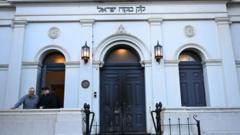In a significant escalation, President Donald Trump has threatened Harvard University’s tax-exempt status just hours after his administration announced a freeze on more than $2 billion in federal funds intended for the prestigious institution. The White House has compelled Harvard, the oldest university in the U.S., to implement changes in hiring and admissions practices to combat antisemitism on its campus. Trump's administration has aimed to reshape policies at leading universities, leveraging financial threats to demand compliance.
Trump Takes Aim at Harvard's Funding and Tax Exemption Amid Antisemitism Controversy

Trump Takes Aim at Harvard's Funding and Tax Exemption Amid Antisemitism Controversy
President Trump intensifies his campaign against Harvard University over claims of antisemitism, threatening its tax-exempt status following a freeze on $2 billion in federal funding.
Harvard became the first major university to reject the demands, which the administration claims are critical to addressing antisemitism. In a social media post, Trump suggested that if Harvard continues to assert itself politically, it should lose its tax-exempt status. "Perhaps Harvard should lose its Tax Exempt Status and be Taxed as a Political Entity if it keeps pushing political, ideological, and terrorist inspired/supporting 'Sickness?'" Trump stated. The implications of losing this status could potentially cost the university millions, even as its endowment stands at an impressive $53 billion.
On Tuesday, White House Press Secretary Karoline Leavitt reiterated Trump's expectation for Harvard to apologize for its purported tolerance of antisemitism. The demands outlined by the administration have the potential to fundamentally alter Harvard's operational autonomy. These include reporting students deemed "hostile" to American values and ensuring a diverse academic viewpoint.
Critics view the government's stance as a bid to undermine academic independence and free speech. Harvard President Alan Garber clearly stated the university would not yield to what he perceived as governmental overreach. He argued that while some government requests aimed to combat antisemitism, many represented an intrusive regulation of intellectual discourse.
In reaction to Trump's actions, Harvard professors have initiated legal action, claiming that the government is unlawfully infringing on free speech and academic freedom. The situation reflects the growing tension between political forces and higher education institutions in the U.S., with studies indicating declining public confidence in higher education, particularly among conservative citizens.
Subsequently, Columbia University, another elite institution, faced a similar ultimatum from the Trump administration but has taken a more nuanced approach, stating it would seek funding while maintaining its independence. This unfolding conflict illustrates the precarious relationship between academia and government under Trump's presidency, with potential long-standing ramifications on academic freedom and funding dynamics in American higher education.
On Tuesday, White House Press Secretary Karoline Leavitt reiterated Trump's expectation for Harvard to apologize for its purported tolerance of antisemitism. The demands outlined by the administration have the potential to fundamentally alter Harvard's operational autonomy. These include reporting students deemed "hostile" to American values and ensuring a diverse academic viewpoint.
Critics view the government's stance as a bid to undermine academic independence and free speech. Harvard President Alan Garber clearly stated the university would not yield to what he perceived as governmental overreach. He argued that while some government requests aimed to combat antisemitism, many represented an intrusive regulation of intellectual discourse.
In reaction to Trump's actions, Harvard professors have initiated legal action, claiming that the government is unlawfully infringing on free speech and academic freedom. The situation reflects the growing tension between political forces and higher education institutions in the U.S., with studies indicating declining public confidence in higher education, particularly among conservative citizens.
Subsequently, Columbia University, another elite institution, faced a similar ultimatum from the Trump administration but has taken a more nuanced approach, stating it would seek funding while maintaining its independence. This unfolding conflict illustrates the precarious relationship between academia and government under Trump's presidency, with potential long-standing ramifications on academic freedom and funding dynamics in American higher education.




















